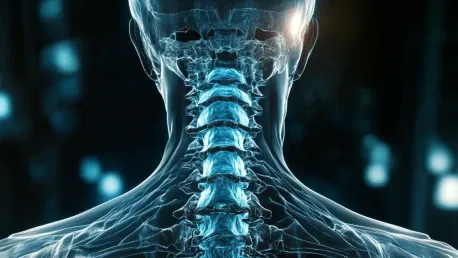In a significant stride for medical imaging technology, Avicenna.AI, a company specializing in artificial intelligence for imaging, has secured 510(k) clearance from the U.S. Food and Drug Administration (FDA) for its CINA-CSpine tool. This advanced AI tool is designed to assist in detecting and prioritizing cervical spine fractures using computed tomography (CT) scans. The move represents a milestone in the application of artificial intelligence to healthcare, potentially transforming the accuracy and efficiency of medical diagnostics.
Validation Process and Performance Metrics
Rigorous Assessment and Diverse Data Sources
The validation process for CINA-CSpine was exhaustive, involving over 300 noncontrast CT scans sourced from both the United States and Europe. This comprehensive assessment encompassed 36 different scanner models supplied by five different vendors. Such a diversified data set ensures that the tool is robust and adaptable across a wide range of clinical settings and equipment types. The extensive cross-validation against various scanner models furthers the credibility of CINA-CSpine, emphasizing its reliability and performance consistency in real-world scenarios.
Benchmarking an AI tool for medical diagnostics necessitates a comparison with human experts. In this case, CINA-CSpine was evaluated against the consensus of three U.S. board-certified senior radiologists. The tool achieved an overall sensitivity of 90.3% and a specificity of 91.9%, metrics that underscore its high level of accuracy. Sensitivity refers to the tool’s ability to correctly identify cases of cervical spine fractures, while specificity measures its aptitude for correctly ruling out non-fracture cases. These performance metrics affirm the tool’s potential to significantly aid radiologists by reducing workload and expediting critical diagnoses.
Implications for Patient Care
The FDA clearance of CINA-CSpine signifies not just a technological advancement but also a substantial leap forward in patient care. By accurately and swiftly identifying cervical spine fractures, the tool can help medical professionals prioritize cases that require immediate attention. This can be particularly crucial in emergency settings where time is a critical factor. Early and accurate detection of fractures can lead to more timely interventions, improving patient outcomes and potentially saving lives.
Moreover, the tool’s high specificity is equally important as it reduces the likelihood of false positives, which can lead to unnecessary treatments and increased patient anxiety. By providing reliable diagnostic information, CINA-CSpine helps streamline the workflow in radiology departments, allowing radiologists to focus on complex cases that require their expertise. The tool’s integration into clinical practice thus holds promise for enhancing both the efficiency and effectiveness of medical care.
Broader Trends in AI and Medical Imaging
Advances in Musculoskeletal Radiology
In addition to the CINA-CSpine tool, the article also sheds light on various advancements within musculoskeletal radiology. One notable development is the improved effectiveness of MRI definitions for knee osteoarthritis, which offers better insights into disease progression and management. The MSKI-RADS system, designed for the classification of MRI findings related to extremity infections, is another innovation highlighted. This system aims to standardize reporting, making it easier for healthcare providers to interpret and act upon MRI results effectively.
Another significant leap is the use of CT scans for assessing bone mineral density in men, a method that offers a non-invasive alternative for evaluating bone health. These advancements collectively point to a trend of integrating advanced imaging techniques with AI to improve diagnostic accuracy and patient management. The synergy between machine learning and traditional imaging modalities underscores a broader movement toward more precise and personalized medical care.
Integration and Regulatory Milestones
The article touches on various regulatory milestones that signify a growing acceptance and integration of AI tools within clinical practice. Earlier in the year, Avicenna.AI received FDA clearance for several other tools, including CINA-iPE, CINA-Aspects, and CINA-VCF. This series of regulatory approvals indicates that AI-driven diagnostic tools are rapidly gaining a foothold in the healthcare industry. Each approval not only validates the technology but also signifies trust in its reliability and utility in improving patient outcomes.
Regulatory clearances serve as a critical benchmark for the adoption of new technologies in clinical settings. They provide a stamp of approval that reassures healthcare providers of the tools’ safety and effectiveness. As more AI tools receive FDA clearance, the integration of these technologies into everyday medical practice is likely to accelerate. This trend highlights the potential of AI to revolutionize medical diagnostics, bringing about more consistent, accurate, and timely healthcare solutions.
The progress in this field reflects a broader trend toward the adoption of AI and machine learning in healthcare, aimed at improving diagnostic precision, standardizing classifications, and supporting treatment decisions. Collectively, these advancements contribute to a more nuanced and sophisticated understanding of how artificial intelligence can be harnessed to enhance healthcare outcomes, particularly in medical imaging.
Conclusion
Avicenna.AI, specializing in artificial intelligence for medical imaging, has achieved a landmark moment with its CINA-CSpine tool receiving 510(k) clearance from the U.S. Food and Drug Administration (FDA). This is a significant development in medical imaging technology. The sophisticated AI tool is engineered to aid in the detection and prioritization of cervical spine fractures through the use of computed tomography (CT) scans. The FDA’s clearance marks a pivotal step forward in the integration of artificial intelligence in healthcare, promising to enhance both the precision and efficiency of medical diagnostics. With this approval, Avicenna.AI is positioned to impact the medical field substantially, potentially redefining how cervical spine injuries are identified and managed. This FDA endorsement is not just a milestone for the company but also a signal of broader acceptance and potential for AI-driven diagnostic tools to address critical healthcare challenges. The use of AI in such settings could lead to quicker, more accurate diagnoses, ultimately improving patient outcomes and streamlining medical procedures.









